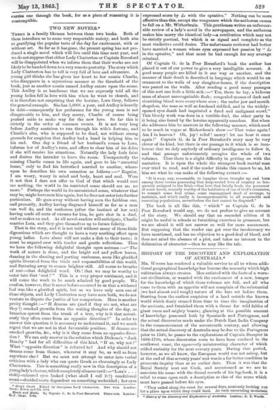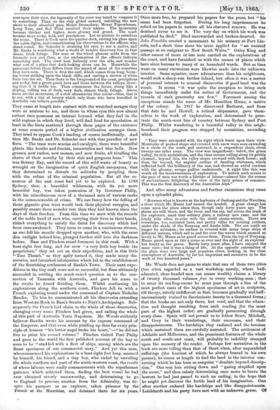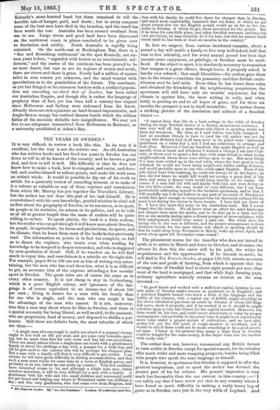HISTORY OF THE DISCOVERY AND EXPLORATION OF AUSTRALIA.*
Mit. WOODS has rendered a valuable service to all to whom addi- tional geographical knowledge has become the necessity which high cultivation always creates. Men satiated with the facts of a worn- out civilization, or wearied with the excitement of a new, hunger for the knowledge of which these volumes are full, and all who come to them with an appetite will not complain of the substantial (we had almost said tough) nature of the fare set before them. Starting from the earliest suspicion of a land outside the known world which dimly crossed from time to time the imagination of the ancients, and furnished them with a theme for wild fables of giant races and mighty beasts ; glancing at the possible amount of knowledge possessed both by Spaniards and Portuguese, and the actual discoveries made under the Dutch East India Company in the commencement of the seventeenth century, and allowing that the actual discovery of Australia may be due to the Portuguese prior to 1540, he passes to the explorations of Captain Dampier in 1688-1700, whose discoveries seem to have been confined to the southwest coast, the apparently uninteresting character of which stifled curiosity for the next seventy years. During that period, however, as we all know, the European world was not asleep, but at the end of that seventy years' rest was in a far better condition to prosecute inquiry than at an earlier date. Then it was that the Royal Society sent out Cook, and accustomed as we are to associate his name with the dismal records of his log-book, it is a relief to come upon such a description as this of the scene which must have passed before his eyes.
"They sailed along the coast for several days, anxiously looking out for a place upon which they could land. As each succeeding mountain *Hiders of the Discovery and Exp1sration of Australia. London; E. T. Wood& rose upon their view, the ingenuity of the crew was taxed to compare it to something. Thus, as the ship glided onward, unfolding the new shore to their absorbed gaze, Mount Dromedary, Mount Pigeonhouse, Long Nose, and Red Point received their names. The mountains became thicker and higher, more gloomy and grand. The coast became more rocky, bold, and precipitous. Let us picture to ourselves the scene. There is Cook upon the quarter-deck, resting his glass upon the cabin-lights, and communicating his observations to the officers who stand round. Dr. Solander is straining his eyes to see a native, and Mr. Banks is wondering what a world of botanic discovery lies in that dense, thick foliage. The man at the wheel glances aside from the binnacle now and then, as the exclamations of the officers indicate something new. The crew lean listlessly over the side, and wonder what sort of a place that dark-looking shore can .be. Meanwhile the panorama before them differs from the aspect of most of the countries they have seen. There is first the surf, which comes from long, boom- ing waves striking upon the black cliffs, and casting a shower of white foam into the air. Then there is the foreground of the coast, precipitous and rocky, but a green patch here and there between the valleys, show- ing that it is fertile too. Then commences the forest, rising like a sloping, rolling sea of dark, very dark, almost black, foliage. Above them are the mountains, of a rich ultramarine blue colour—blue, that is to say, with a tint of beauty which only those who have travelled in Australia can believe possible."
They came at length into contact with the wretched savages they were so anxious to see, and those in whose eyes this now almost extinct race possesses an interest beyond what they feel in the wild regions in which they lived, will find food for speculation at least in the hints scattered through these pages of the existence at some remote period of a higher civilization amongst them. They tried to oppose Cook's landing, of course ineffectually. And then Mr. Banks and Dr. Solander met with that paradise of new flora. "The trees were acacias and eucalypti, there were beautiful plants like heaths and fuschia,, immortelles and blue bells. New grasses, new rushes, new mosses, and new fruits, all rivalling the charm of their novelty by their rich and gorgeous hues." This was Botany Bay, and the record of this wild waste of beauty so wrought on the imagination of quiet English ratepayers, that they determined to disturb its solitudes by peopling them with the refuse of the criminal population. But all the re- sources of the east coast had yet to be explored. In 1788 Sydney, then a beautiful wilderness, with its yet more beautiful bay, was taken possession of by Governor Philip, with his miscellaneous crew of a thousand men of various ranks in the commonwealth of crime. We can fancy how the felling of those gigantic gum trees would task their physical energies, and possibly ensure them sounder rest than they had known since the days of their freedom. From this time we meet with the records of the noble band of men who, carrying their lives in their hands, risked everything to satisfy the thirst for discovery which had been once awakened. They seem to come in a continuous stream, as one fell his mantle dropped upon another, who, with the same dim twilight behind him, plunged further still into the darkness before. Bass and Flinders stand foremost in this rank. With a boat eight feet long, and for crew "a very little boy beside the proprietors," they set out on their expedition, and in this little "Tom Thumb," as they aptly named it, they made many dis- coveries, and furnished information which led to the establishment of the flourishing settlement of Banks's Town. Their next expe- ditions in the tiny craft were not so successful, but Bass ultimately succeeded in settling the much-vexed question as to the con- nection of Tasmania with Australia, and gave his name to the straits he found dividing them. Whilst continuing his explorations along the southern coast, Flinders fell in with a French exploring vessel under the command of Captain Nicholas Baudin. To him he communicated all his discoveries extending from Western Rock in Bass's Straits to Nut's Archipelago. Sub- sequently the French laid claim to the whole of these discoveries, changing every name Flinders had given, and calling the whole of this part of Australia Terre Napoleon. Mr. Woods evidently believes Baudin wrote his account by the express command of the Emperor, and that even while yielding up thus far every prin- ciple of honour "his better angel broke his heart,"—" he did not live to print his second volume." Flinders visited Port Philip and gave to the world the first published account of the bay so soon to be "studded with a fleet of ships, among which are the finest specimens of our commercial navy." And yet this man, who commenced his explorations in a boat eight feet long, manned by himself, his friend, and a tiny boy, who ended by unveiling the whole southern and part of the north-western coast, the results of whose labours were really commensurate with the superhuman patience which achieved them, finding the best vessel he had ever obtained utterly unseaworthy, and determining to go to England to procure another from the Admiralty, was de- spite his passport as an explorer, taken prisoner by the French at the Mauritius, and detained there for six years. Once more free, he prepared his papers for the press, but " his name had been forgotten. During his long imprisonment he relied on his papers to restore all his obscured renown. He was _ destined never to see it. The very day on which his work was published he died." Died unrewarded and broken-hearted. Sir John Franklin erected a monument to his memory at Port Lin- coln, and a short time since his niece applied for "an assisted passage as an emigrant to New South Wales." Oxley King and other names of more or less note carried on the explorations of the coast, and have furnished us with the names of places which have since become to many of us household words. But as time went on many excursions were likewise made into the unknown interior. Some squatter, more adventurous than his neighbours, would seek a sheep-ran farther inland, but often it was a matter of personal interest to conceal discoveries if good land was the result. It seems "it was quite the exception to bring such things immediately under the notice of Government, and the records of such generosity are few." Foremost among the exceptions stands the name of Mr. Hamilton Hume, a native of the colony. In 1817 he discovered Bathurst, and from that date he and Howell, a retired shipmaster, gave them- selves to the work of exploration, and determined to pene- trate the south-west line of country between Sydney and Port Philip. Whilst wandering in a beautiful valley in this neigh- bourhood their progress was stopped by mountains, ascending which "They were astounded with the sight which burst upon their view. Mountains of peaked shape and covered with snow were seen extending in a circle to the south and eastward, in a stupendous chain, about twenty-one miles away. The view was magnificent: below, the green valley, its rich undulations, and the clear stream rolling along its pebbly channel; beyond this, the valley slopes crowned with dark forest ; and then, far beyond, the angular outline of dazzling whiteness, which reflected back the brilliancy of the FM; and showed an awful contrast with the gloomy, savage gullies underneath. A eight like this was worth all the inconveniences of exploration. To unlock such scenes to the gaze of men was worth a lifetime of labour—almost like the scenes of enchantment, delighting the view of the fairy prince of romance. This was the first discovery of the Australian Alps."
And after many adventures and further excursions they came upon a splendid plain,
"Between what is known as the harbours of Geelong and the Werribee, a river which Mr. Hume had named the Arndell. A great change has come upon the place since then, though only forty years ago. The plains are still there, and the river, and theses, but across the track of the explorers, amid that solitary plain a railway now runs, and the lonely hills often re-echo with the shrill steam-whistle. There are townships, too, scattered here, and pretty villas for retiring settlers, under the shade of the Youyang and Anake hills. The sea could no longer be mistaken; its surface is covered with many large ships of different nations, which sail to and fro over the waves which seemed so lovely to Mr. Hume as he gazed across them. From the top of Yonyang, Hume gazed upon as fair a scene as ever met the sight of an explorer but lonely as the grave. Barely forty years after, I have enjoyed the same view ; but it was a thing of life. At the opposite extremities of the plain were two large and populous cities, looking, in the clear atmosphere of Australia, by far too important and extensive to be the work of two hundred years."
Mr. Woods does not pause to state that one of those two cities (too often regarded as a vast workshop merely, where half- educated, clear-headed men can amass wealth) claims a library of twenty thousand volumes free to every working-man ; that to enter its reading-rooms he must pass through a line of the most perfect casts of the highest specimens of art in sculpture, till the eye, utterly indifferent at first, becomes gradually and half- unconsciously trained to discriminate beauty in a thousand forms ; that the books are not only there, but read, and that the educa- tion and thought resulting from such reading (for the most part of the highest order) are gradually permeating through every class. Space will not permit us to follow Sturt, Mitchell, and Grey in their wanderings, their successes, and their disappointments. The hardships they endured and the heroism which sustained them are carefully narrated. The settlement of Adelaide and Melbourne, and the prominent features of the whole south and south-east coast, will probably be indelibly stamped upon the memory of the reader. Perhaps few narratives in the book are more telling than that of Start when, after unparalleled sufferings (the heaviest of which he always braved in his own person), he comes at length to find the land in the interior con- cerning which he has been so sanguine "desolate beyond descrip- tion." One sees him sitting down and "gazing stupified upon the scene," and then calmly determining once more to brave the horrors he had just passed to such an ending, in the hope that he might yet discover the fertile land of his imagination. One after another endured like hardships and like disappointments. Leichhardt and his party have met with an unknown grave. Of Kennedy's stout-hearted band but three, remained to tell the horrible tale of hunger, peril, and death ; but in every conquest some of the beat men have died in the trenches, and the result has been worth the cost. Australia has been crossed overland from sea to sea. Large rivers and good land have been discovered on the northwest coast, in places concluded to be given over to desolation and aridity. North Australia is rapidly beiug colonized. On the north-east at Rockingham Bay, there is a "fine and flourishing settlement" on the spot Kennedy, not six- teen years before, "regarded with horror as an irreclaimable wil- derness," and the centre of the continent has been proved to be no mere desert, but vast as are its regions of stones and scrub, there are rivers and there is grass. Nearly half a million of square miles in area remain yet unknown, and the mind wearies with speculations as to the possibilities of the future. The continent, as yet but fringed at its extremest borders with a civilized popula- tion not exceeding one-third that of London, has been called our Australian Empire, and though this is rather the language of prophecy than of fact, yet less than half a century has elapsed since Melbourne and Sydney were redeemed from the forest. Already there are rich squatters on land deemed impenetrable, and Anglo-Saxon energy has realized dreams beside which the wildest fables of the ancients dwindle into insignificance. We may yet live to see telegrams transmitted from Melbourne to Bathurst, or a university established at Adam's Bay.
































 Previous page
Previous page